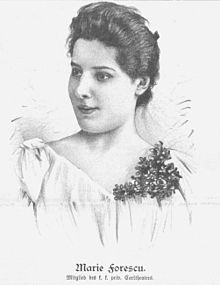Maria Forescu
| Maria Forescu | |
|---|---|
 |
|
| Born |
Maria Füllenbaum 15 January 1875 Czernowitz, Austria-Hungary |
| Died | 23 November 1943 (aged 68) Buchenwald concentration camp, Germany |
| Occupation | Film actress |
| Years active | 1913–1933 |
Maria Forescu (15 January 1875 – 23 November 1943) was an Austro-Hungarian-born German opera singer and film actress. During the silent and talkies era of the German cinema, she appeared in several movies as a supporting actress. When Adolf Hitler came to power, Forescu, like other Jews of that period, was barred from her profession. She died in the Buchenwald concentration camp in Germany.
Forescu was born Maria Füllenbaum on 15 January 1875, in Czernowitz, Austria-Hungary. She attended a boarding school in Paris. She studied singing, music and drama at the Prague Conservatory. Around the turn of the century, she debuted as an operetta singer and soon became a well known member of the renowned Viennese Carl Theater. She also performed in several of the tours organized by the theater throughout Europe. Then she went to Berlin, where she appeared at the theater of the West, at the Operetta Theater, and the Metropolitan Theater.
She made her film acting debut in 1911 with the Charles Paulus-directed Die Pflicht. She left singing in 1915 to concentrate on her film acting career. She mainly appeared as a supporting actress. After the advent of the talkies she acted in several films of her friend Harry Piel. She had played the character of Yelina in the crime film Marizza. The most popular films in which Maria Forescu acted were the Gerhard Lamprecht-directed Zwischen Nacht und Morgen and the Hans Behrendt-directed Danton (both 1931). In the 1929 film Der Sittenrichter. § 218. Eine wahre Begebenheit, Forescu played the woman who aborted the heroine's child. The film was considered controversial for depicting the topic of abortion. She also starred in the 1920 silent film The Women House of Brescia. The film was rejected by the British Board of Film Classification.
...
Wikipedia
